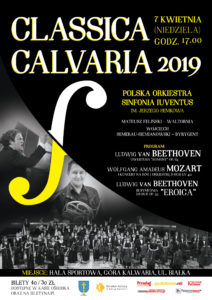Classica Calvaria 2019
 7 April 2019, 5 pm
7 April 2019, 5 pm
Sport Hall in Góra Kalwaria
Performers:
Mateusz Feliński – French horn
Jerzy Semkow Polish Sinfonia Iuventus Orchestra
Wojciech Semerau-Siemianowski – conductor
Programme features:
Ludwig van Beethoven Overture Egmont op. 84
Wolfgang Amadeus Mozart I Horn Concerto in D major, K.412/386b
Camille Saint-Saens – Romance op.36,
interval
Ludwig van Beethoven Symphony No.3 Es-major, Eroica op. 55
The concert features two operas of Beethoven – Symphony No.3 Es-major called „heroic” by the author himself (which is quite rare, as many analogous titles have been given by publishers against composers’ will) and Overture Egmont, telling a tragic story of Goethe’s play’s hero – a Flemish count-governor Lamoral van Egmont (1522-1568), a catholic and a loyal general in Philip’s II of Spain service. At a certain point the general stood against Spanish regime of his country and bloody persecutions of protestants for which he was finally executed. Goethe’s play is based on love story between Egmont and Clair, that faced with despair considering the death sentence of his lover, decides to put an end to her life by taking poison. The night preceding the execution she appears in Egmont’s dreams and prophesizes forthcoming victory of his ideals. Monumental overture has – as it should have – nature of a manifesto and states clearly the strategic motives of a tragedy: bestiality of an invader, people’s misery, virtuous character of Egmont, pure feelings concerning Clair and posthumous glory.
Originally the play’s hero was supposed to be Napoleon Bonaparte whose republican and liberation ideals were close to composer’s ones however Beethoven crossed off the dedication as he got furious over Napoleon proclaiming himself a an emperor and finally the opera was published under less specific title in Italian: Sinfonia eroica, composta per festeggiare il sovvenire d’un grand’uomo. Despite countless trials, the piece still slips off any politically directed interpretation. The main hero is rather a cluster of ideas than a concrete being while music does not tell a story – it rather symbolizes universal values such as beauty, love, good and sacrifice; values that reappear in The Creatures of Prometheus (its motive is citied in the Symphony’s finale as a topic of variations) in Fidelio and in The Ninth. The Third Symphony, with its classic architectonics, is marked with many formal innovations but this was not the reason of radical emotions reported among listeners on 7 April 1805 – the day of premiere. The most innovative and controversial was extraordinary size of the piece and strength of music expression: pathos, passion, monumentality of sound and dramatic contrasts. Full appreciation of Eroica was still about to come and finally successive generations of composers and music lovers considered it a model and a symbol of great symphonic music of 19th century.
Ignaz Leutgeb (1732-1811) was one of the most famous French Horn players at the times and in the cultural circles of Mozart. It was him to whom Mozart dedicated his Quintet in E-flat major KV 407 and four concerts for horn (and a number of broad jokes about himself; also in Concerto’s in D major score one can find hilarious comment addressed to the horn player). These cheerful pieces are both to show the mastery the horn player can achieve and its lyric nature. Written in 1791 The Concerto in D major is marked with number one, however it was actually the last one, as that was the last year of short Mozart’s life. In the vivid “hunting-like” rondo one finds a mysterious quote from Gregorian chant choral for Lent. Supposedly it was Süssmayr’s and not Mozart idea, which was a subject of numerous interpretations (among which also one claiming that the student used by mistake the melody written for Requiem and noted somewhere by Mozart). The piece is going to be performed by Mateusz Feliński, the first horn player of NFM Wrocław Philcharmonic, a soloist, a chamber musician, a member of Lutosair Quintet that collaborates with many orchestras in Poland and abroad. The concert is going to be conducted by Wojciech Semerau-Siemianowski, a graduate of the Bydgoszcz Academy of Music in piano and of The Fryderyk Chopin University of Music in conducting. In 2011-2012 Wojciech Semerau-Siemianowski was an acting artistic director of Opera at the Castle in Szczecin and remains the youngest person ever holding such duty in Poland.
Tickets 40/30 zł
available at box office in the Sport Hall and on: https://bit.ly/2J7UcEG
Piotr Maculewicz
tłum. Marta Pietraszek
